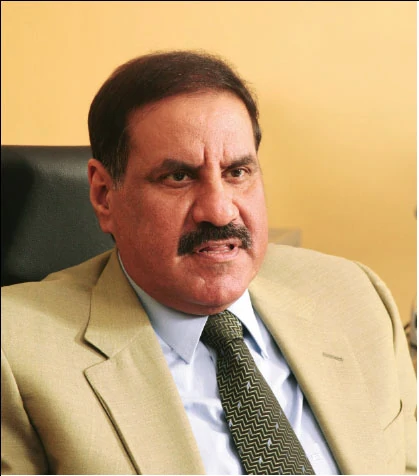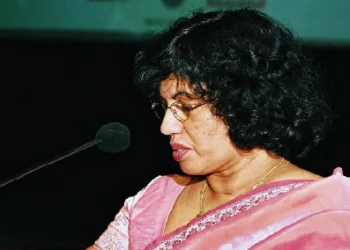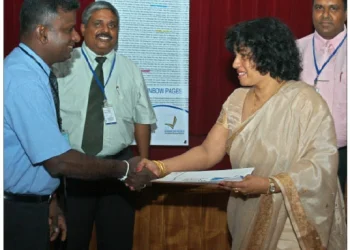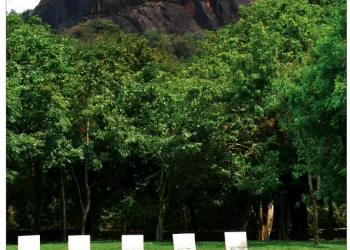
Fahad Almetairi, Kuwaiti Ambassador to Sri Lanka speaks on the bilateral relationship between the two nations and the mutual benefits for both parties.
By Keith Bernard
Excellency, how long have you been Ambassador to Sri Lanka and where did you serve before arriving in Sri Lanka?
I have been in Sri Lanka for almost two years now. I am a career diplomat, and before posted to Sri Lanka, I served in Aden, South Yemen before unification, in Riyadh, Saudi Arabia, in Doha, Qatar, in Cairo, Egypt as Consular, second in Embassy hierarchy, thereafter Ambassador to Malaysia, and at present Ambassador to Sri Lanka and the Republic of Maldives.
Your Excellency facilitated the State visit to your country by our President H E President Mahinda Rajapaksa. What were the objectives of that visit and what has been the outcome?
There were several outcomes of that visit, including an exchange of prisoners between Kuwait and Sri Lanka where Kuwait agreed to return more than 3,000 Sri Lankans held in prison, and an agreement to exchange cooperation in the fields of culture, media, science and education. Honourable Mr Rohitha Bogollagama, Foreign Minister of Sri Lanka and Sheikh Sabah Al Khalid Al Sabah, Labour Minister of Kuwait signed the agreement which I think has had positive outcomes for both countries.
“The Kuwaiti Investor Who I Suspect You Are Referring To, Is Investing In Sri Lanka But Is Facing Many Problems With His Investments.”
Your country has extended technical assistance grants and loans to Sri Lanka through the Kuwait Fund. Could you please explain how the Fund operates and how Sri Lanka can benefit from it?
The Kuwait Fund for Arab Economic Development, commonly known as the Kuwait Fund, is the State of Kuwait’s agency for the provision and administration of financial and technical assistance to developing countries. Founded in December 1961, the Fund was created as a message from the Kuwait people, ensuring that ” Here we are embarking on the tides of change, but we will not forget our friends in need”. Since July 1974, the scope of the Fund’s activities is extended to the rest of the developing world, from its original mandate of solely helping countries in the Arab world. Since inception, the Kuwait Fund has given over 700 loans to over 100 beneficiary countries.
The Fund has financed several projects in Sri Lanka. Some of the assistance offered cover the Mahaweli Ganga Development, Hambantota Irrigation Rehabilitation, rural electrification, urea fertilizer, rehabilitation of tsunami damaged education and administrative infrastructure, South Eastern University of Sri Lanka Development, bridge reconstruction and rehabilitation etc.
Sri Lanka has therefore benefited from the fund and the results are there to see. It is customary that prior to granting loans, the projects to be funded are thoroughly studied and scrutinised by both governments.
The highways and bridges in Sri Lanka are clear evidence of the assistance of Kuwait to the Sri Lankan people through the Kuwait Fund. The Mahaweli Project, Alawwa Bridge, Eastern University are some of the well-known projects supported by the Kuwait Fund.
The Sapugaskanda Fertilizer Project, one of Sri Lanka’s biggest industrial undertakings is another case in point. The complex includes an ammonia plant with a capacity of 545 metric tonnes per day, and a urea plant with a capacity of 940 metric tonnes. The project is expected to save the country about US$ 32 mn a year in foreign exchange. Nearly a fifth of the total investment is funded by the Kuwait Fund.
A new project of US$ 35 mn for Sri Lanka was recently approved.
Kuwait has the capacity to facilitate large-scale investments, particularly in infrastructure development in Sri Lanka, but why has that not happened?
Kuwait or for that matter any other country in the world would not invest without an Investment Protection Mechanism in place. True to the quote “Capital is a Coward”, no one will invest blindly in the hope his investment will run smoothly.
Despite the lack of a legal process specifically designed to offer protection to foreign investors, many foreigners including at least one well-known investor from your country have invested and continue to invest in Sri Lanka. Also, any investment carries some level of inherent risk. What exactly is the type of investment protection you think is necessary?
That is true, there is no protection for foreign investors, but the Governments of Kuwait and Sri Lanka are working on signing a Bilateral Investment Protection Agreement. We hope this agreement will be signed soon.
The Kuwaiti investor who I suspect you are referring to, is investing in Sri Lanka but is facing many problems with his investments. Every country has an Investment Protection Plan, particularly long term plans. A Long Term Investment Protection Agreement is imperative towards enticing foreigners to make large-scale investments in infrastructure and major projects.
Such a long term agreement is necessary to assure the investor of the safety of his investment. Ideally, for these large-scale investments to be attractive to the investor, the Investment Protection Agreement should extend to over a time period of about 50 to 70 years.
I doubt foreign investors would break the laws and regulations of the country, but most certainly it is not an appealing prospect for them if they have to go to Court to wait for 15 to 20 years for an outcome. An Arbitration Court or alternatively acceptable dispute resolution mechanism capable of offering redress to an investor within a couple of months would perhaps be a preferred solution and appeal better to prospective investors.
“We are funding two projects…first, ‘Kuwait City’ comprising 100 houses, and the second, ‘Jabar Al-Ahmed City’ in Ampara, another 100 houses.”
Do you think the incentives and safeguards offered by the Board of Investment of Sri Lanka are inadequate?
As already discussed, the Governments of Kuwait and Sri Lanka are still in the process of studying the Investment Protection Agreement, and we are hopeful of a satisfactory outcome of the process.
What areas do you think Kuwait would be ideally interested in investing in Sri Lanka?
Kuwait knows that Sri Lanka has potential for growth and is a beautiful country with friendly people. Kuwait could possibly look at major investments such as mega shopping malls, amusement parks, infrastructure projects such as major highways, apartment complexes, airports, trains and railroads, hotels and many others. These investments could benefit the people of Sri Lanka in the form of new jobs and enhancing lives and living standards and social conditions.
Your country has invested as a State and also through the Kuwait Fund in large projects in countries such as Egypt, Lebanon and Jordan. Would you like to briefly explain the type of investments these countries have received and how they have been structured to provide for investment protection and repayment?
There is a difference between the Kuwait Fund and investors. The Kuwait Fund finances large projects as loans with low percentage interest rates of around 2% maximum on the basis of government-to-government understanding. The Kuwait Fund has financed many large-scale projects in many countries including those you just mentioned. Investors on the other hand are mainly from the private sector and seek overseas investments that offer attractive returns, subject to an investment protection mechanism in place. The absence of such a mechanism could possibly easily dissuade such private investment.
Has Kuwait invested in India, Pakistan, Bangladesh etc? If so what is the typical nature of investments and magnitude?
Funding to India, Pakistan and Bangladesh are mainly towards infrastructure by both the Kuwaiti government as well as private institutions of Kuwait.
Bangladesh received funding for 22 projects, including electrification of rural areas and irrigation of 160,000 acres of farmland. In Pakistan, funding has been provided for road and railway projects and the Lyari expressway, in all about 17 projects. Eight projects such as dams, ports and power plants, Nagarjuna Dam etc have been funded in India.
“The Visit By H E President Mahinda Rajapaksa In May 2007 To Kuwait Is Greatly Valued With Several Agreements Signed During That Visit.”
Kuwait invested in a housing project in the Eastern Province of Sri Lanka. Would you mind shedding some light on this project and its current status?
We are funding two projects in Batticaloa and Ampara respectively. The first, ‘Kuwait City’ comprising 100 houses, and the second, ‘Jabar Al-Ahmed City’ in Ampara, another 100 houses. They are both complete and distributed to Sri Lankans of all religions without distinction. I would like to emphasise that these are not investments, but are donations or gifts from Kuwait Red Crescent and Kuwait Zakat House.
The Kuwait Red Crescent Society has played a great role in extending help to the Sri Lankan people by distributing boats, five water purification systems, building of houses etc. In addition to the housing projects in the Batticaloa and Ampara districts temporary houses were also set up in the Puttalam district. The Kuwait Red Crescent Society, out of concern towards supporting health, completed a hospital project in Puttalam styled under the name ‘Kuwait Hospital.’ The hospital is complete with emergency treatment units, an operating theatre, x-ray unit, ultra-sound unit, sound unit etc. The Society also conducted several eye camps in Sri Lanka, with more than 2,000 eye patients benefiting from the programme. We are planning to have an eye clinic very shortly for a minimum of 1,500 patients.
The service offered by the ‘Zakat House’ is yet another high point in relations between our countries. Muslims in Sri Lanka received several gifts in the form of constructing mosques, water wells, schools, an orphanage, shelter for the poor and more. The orphanage gifted will care for 720 male and female orphans. The facility includes a school and orphanage for boys, a school and orphanage for girls, a mosque, dining room, vocational training centres and a laundry section, multi-purpose room, bakery, staff quarters for both families and singles, workers room, administration office, clinic, stores, science section, computer section and library. The main beneficiaries of the orphanage are some of those from the northern and eastern provinces who were rendered destitute by the tsunami. Total cost of this project is approximately Rs 487 mn.
Another area that has received help from Kuwait is education. More than 20 Sri Lankan students are currently in Kuwait on scholarships awarded by the government of Kuwait. More than 35 students have passed from Kuwait University and University Colleges.
Kuwaiti people are generally well known for their generosity, philanthropy and hospitality.
Sri Lanka can potentially be an ideal tourist destination for people of your country given the geographical proximity and other natural attractions. Do you agree? And if you do, in your view how do you think Sri Lanka should position itself to attract the high yield tourists from your country and region?
Sri Lanka has all the natural attractions – beaches, mountains, rivers, waterfalls, ideal weather – for tourists from all parts of the world, and above all, Sri Lankan people are naturally very hospitable and friendly. To attract the high yield tourists the tourism infrastructure however require some improvements, such as more five-star hotels preferably offering novelties, large shopping centres, entertainment cities, particularly in the tourist areas like Nuwara Eliya, Kandy, Galle, etc.
Kuwait is also one of the largest employers of Sri Lankan expatriate workers. Do you think there is potential to expand cooperation in this regard, especially in the skilled and professional job categories?
Sri Lankan expatriates have increased significantly since my arrival and will further increase. There are more than 160,000 Sri Lankans happily employed in Kuwait. We suggest that Sri Lanka train and build a skilled labour force for overseas work rather than continue to offer unskilled workers.
“Sri Lankan expatriates have increased significantly since my arrival and will further increase.”
Kuwait is an active member of the Gulf Cooperation Council, which was set up by the Kingdom of Saudi Arabia in 1981. Although the original purpose of the Council was toward protecting the six members of the Council and encouraging cooperation, the Council I believe now collectively offers support and assistance to other developing countries as well. Could you please explain how the Council collectively offers such assistance?
The GCC does not offer assistance in cooperation, but as individual contributors within the Council. The countries assist in their own right as done in the past for instance during the tsunami disaster. Kuwait sent food supplies to the displaced victims, built houses, gave fishermen boats and much more. Other GCC members countries too helped in like manner.
Our President His Excellency Mahinda Rajapaksa has shown great interest in developing and strengthening relations between Sri Lanka and the Middle East. How do you see this development and more importantly how do you think your country would respond towards strengthening future ties with Sri Lanka?
The Middle East has had great bilateral relations with Sri Lanka spanning decades, especially with the GCC countries, and these relations will be protected and nurtured in the years to follow. Kuwait hopes these relations will significantly improve in the near future with State visits, investments, tourism, employment, social and cultural exchanges etc.
The visit by H E President Mahinda Rajapaksa in May 2007 to Kuwait is greatly valued with several agreements signed during that visit. Before his visit, former President Chandrika Kumaratunga paid a courtesy visit to Kuwait. Both leaders received a warm welcome from the Kuwaiti authorities.
The relationship between the two countries was enhanced by visits of two Kuwait Trade Ministers to Sri Lanka. The former Trade Minister of Kuwait Mr Jasim Al Muzeef paid a courtesy visit in 1997 and Mr Falah Al Hajiri visited Sri Lanka more recently in 2007. During his visit he underlined the need to explore more avenues for expanding trade volumes between the two countries. Similarly, several Sri Lankan Ministers as well visited Kuwait last year, among them Petroleum Minister, Hon A H M Fowzie, Minister of Foreign Employment HonKeheliya Rambukwella and several other Deputy Ministers.
His Highness Sheikh Sabah Al-Ahmad Al-Jabar Al-Sabah, the Amir of the State of Kuwait is expected to visit Sri Lanka. Will it be soon and is there a date fixed?
There is no date fixed for His Highness Sheikh Sabah Al-Ahmed Al-Jabar Al-Sabah’s, the Emir of the State of Kuwait’s visit, but I believe it will happen in the near future.
And finally, what do you, your Excellency, hope to accomplish before your term of office in Sri Lanka is complete, which we hope will not be soon?
As Ambassador I would like to ensure that relations between our two friendly countries are strengthened. I would also like to see more Kuwaiti investors helping this beautiful country become a bigger attraction for our mutual benefit.





